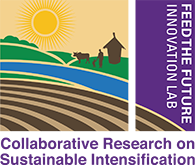Join us on May 3, 2018 in 137 Waters Hall at 3pm for a seminar by Fulbright Senior Scholar Dr. Patrick Kilby.
The Feed the Future Innovation Lab for Collaborative Research on Sustainable Intensification (SIIL) at Kansas State University has served as the host for Fulbright Senior Scholar Dr. Kilby during the 2018 spring semester as he researches gender inclusion in the K-State Innovation Labs. Dr. Kilby’s seminar will highlight his work on the inclusion of women in agriculture.
Click here to download a copy of the seminar announcement.
The Story of the Green Revolution: Where are the Women?
In 1950 Indian Prime Minister Jawaharlal Nehru noted ‘… that while he had observed many men engaged in trades, he had seen few women in training. He warned the crowd that if ‘the other half does not join hands’ in work, the nation could not hope to pull itself up from poverty’. This lecture will explore why women have been excluded from agricultural innovation and technological progress, using the Green Revolution as a starting point.
The term Green Revolution is a phrase coined by USAID Administrator William Gaud in 1968 as a neologism to highlight the successes of US foreign aid in breeding high yielding varieties of cereal grains that led to large increases in grain production, most dramatically in India in 1967 and 1968. The US plant breeder Norman Borlaug won the Nobel Peace Prize in 1970 for his work, the only scientist to do so. ‘Green revolution’ also had a political dimension as a rhetorical counter to the ‘red revolution’ promoted by the communist bloc. It was an important weapon in the Cold War between Chinese and Soviet communism, and the West, to win the hearts and minds of the Third World. Despite the work by Ester Boserup and others in the 1960s on women’s role in agriculture, women farmers weren’t part of either the Green Revolution or its narratives.
Of course, the story of the Green Revolution is much more complex than technology and Cold War rivalries. The successes were limited to countries that could provide the supporting infrastructure of extension services, irrigation, fertiliser and pesticides, etc. More importantly, it did not address issues of inequality and chronic malnutrition, which still remain. This lecture will look at its historical antecedents of the Green Revolution in the US, Europe, and Australia, and argue why including farmers in research plays is an important if not critical role. It will focus on why the second green revolution of the 2010s maybe falling into the same trap as its post war predecessor, if it does not listen to the farmer, who in the 2010s like the 1960s is more often than not a woman.
Dr. Patrick Kilby is a Fulbright Senior Scholar with Kansas State University working with the Sustainable Intensification Innovation Lab (SIIL) which is part of the USAID Feed the Future program, researching gender inclusion in the program. Dr. Kilby is the convenor of the Master of Applied Anthropology and Participatory Development Program, a post graduate program for people wishing to work in international development. He has published widely on international development with three books and numerous journal articles and book chapters, with a focus on gender and development and international NGOs. His current research project is the Story of Aid.



